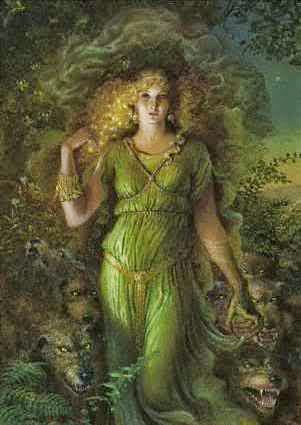Ireland and the Celtic Religion
We have said that the Irish among the Celtic peoples possess the unique interest of having carried into the light of modern historical research many of the features of a native Celtic civilization. There is, however, one thing which they did not carry across the gulf which divides us from the ancient world—and this was their religion.
It was not merely that they changed it; they left it behind them so entirely that all record of it is lost. St. Patrick, himself a Celt, who apostolised Ireland during the fifth century, has left us an autobiographical narrative of his mission, a document of intense interest, and the earliest extant record of British Christianity; but in it he tells us nothing of the doctrines he came to supplant. We learn far more of Celtic religious beliefs from Julius Cæsar, who approached them from quite another side. The copious legendary literature which took its present form in Ireland between the seventh and the twelfth centuries, though often manifestly going back to pre-Christian sources, shows us, beyond a belief in magic and a devotion to certain ceremonial or chivalric observances, practically nothing resembling a religious or even an ethical system. We know that certain chiefs and bards offered a long resistance to the new faith, and that this resistance came to the arbitrament of battle at Moyrath in the sixth century, but no echo of any intellectual controversy, no matching of one doctrine against another, such as we find, for instance, in the records of the controversy of Celsus with Origen, has reached us from this period of change and strife. The literature of ancient Ireland, as we ]shall see, embodied many ancient myths; and traces appear in it of beings who must, at one time, have been gods or elemental powers; but all has been emptied of religious significance and turned to romance and beauty. Yet not only was there, as Cæsar tells us, a very well-developed religious system among the Gauls, but we learn on the same authority that the British Islands were the authoritative centre of this system; they were, so to speak, the Rome of the Celtic religion.
What this religion was like we have now to consider, as an introduction to the myths and tales which more or less remotely sprang from it.

